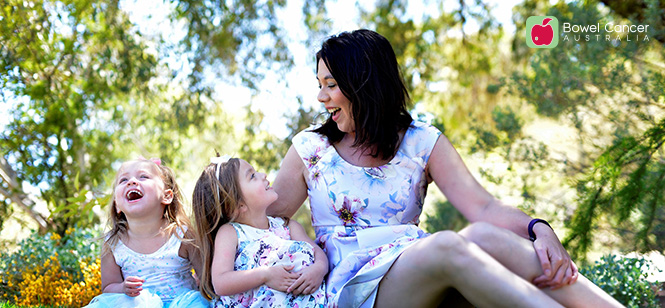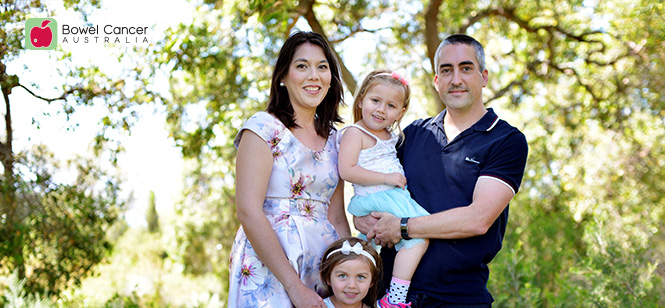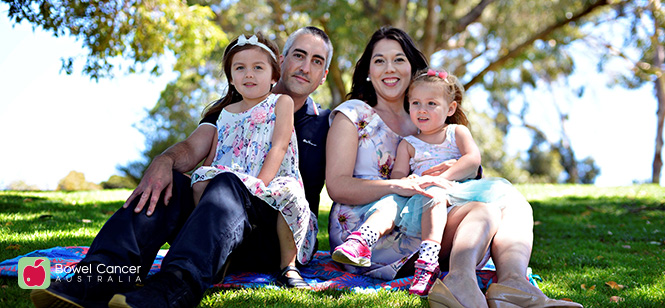Today is World Metastatic Colorectal Cancer Day, a day dedicated to raising awareness about the most advanced form of bowel cancer, also known as metastatic colorectal cancer or mCRC.
Although almost 99 percent of bowel cancer cases can be successfully treated if detected early, fewer than 40 percent are.
In fact, up to half of the those newly diagnosed with bowel cancer, each year will have advanced disease at diagnosis or will go on to develop it.
Once bowel cancer is metastatic, treatment options change.
The type of treatment a patient receives and their response to it can vary greatly; both affect outcomes, which is why a personalised treatment plan needs to be developed.
The good news is that advances in treatment have improved the outlook for many patients with metastatic disease, by slowing down cancer growth, improving the quality of life and helping patients to live longer.
At age 39, working mother of two Alisanne Ride was given between three to six months to live after being diagnosed with advanced bowel cancer which had spread to her liver.


Alisanne is one of approximately five percent of patients with metastatic bowel cancer who has MSI-H or dMMR tumours, which contain abnormalities that affect the proper repair of DNA inside a cell.
Tumours with these biomarkers are most commonly found in bowel, endometrial and gastrointestinal cancers.
As a result of her biomarker status, it was suggested Alisanne try Keytruda® (pembrolizumab), an immunotherapy which has been highly effective in treating other forms of metastatic cancer.
Keytruda works by targeting the cellular pathway known as PD-1/PD-L1 (proteins found on the body’s immune cells and some cancer cells). By blocking this pathway, Keytruda may help the body’s immune system fight the cancer cells, which is why the treatment is referred to as ‘immunotherapy’.
Keytruda recently received provisional approval by Australia's Therapeutic Goods Administration (TGA) for treatment of patients with unresectable or metastatic, microsatellite instability-high (MSI-H) or mismatch repair deficient (dMMR) bowel cancer but has yet to be subsidised for bowel cancer on the Pharmaceutical Benefits Scheme (PBS).
According to the TGA announcement, the continued approval of Keytruda for the new indication will depend on further evidence of clinical benefit from clinical trials.

Because the treatment is not listed on the PBS, Alisanne has had to raid her superannuation and her mortgage to pay for the treatment which equates to $15,000 every 3 weeks.
Since she started taking Keytruda, her lifespan has doubled, and the metastases in her liver are no longer present, although a few small lymph nodes appeared in June for which she received further treatment.
“I didn’t realise you could get an outcome like that. I was literally gobsmacked,” Alisanne told journalist Sue Dunlevy.
“I just turned to my husband and said what about everybody else who doesn’t have the funds to pay for this drug?
“It felt so unfair other people could not get it because they couldn’t afford it.”
“While there is a lot of important discussion regarding bowel cancer screening, treatment options remain vital,” said Bowel Cancer Australia Chief Executive Julien Wiggins.
“Having another treatment option for metastatic bowel cancer patients is much needed."

As with all treatment options, people interested in accessing Keytruda will need to discuss if it is an appropriate treatment for them with their oncologist.
For more information, you can check the Consumer Medicines Information (CMI).
For more information about metastatic bowel cancer, download our comprehensive guide detailing the many possible treatment options for bowel cancer patients who have secondary cancer in the liver, lungs or peritoneum.
To learn more about World mCRC Day, visit getpersonal.global.
If you would like to speak with a Bowel Care Nurse about your diagnosis or that of a loved one, or if you would like to register for the Bowel Cancer Australia Peer-to-Peer Network, where you can be matched with someone who is going through a similar experience, contact the Bowel Cancer Australia Helpline on 1800 555 4394 during business hours Monday to Friday.






